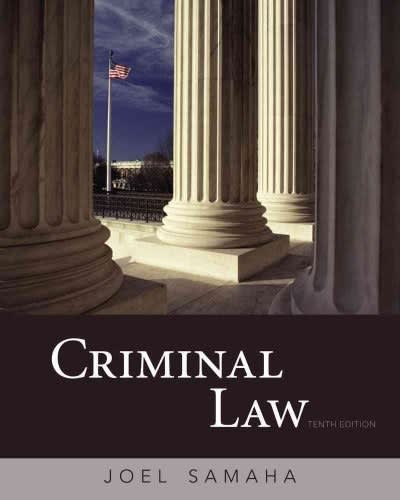Raymond Alexander Young, the defendant, was convicted before the Circuit Court for Prince Georges County, of attempted
Question:
Raymond Alexander Young, the defendant, was convicted before the Circuit Court for Prince George’s County, of attempted armed robbery. He was sentenced to 20 years, and he appealed. The Court of Special Appeals affirmed the conviction and sentence, and Young petitioned for certiorari. The Maryland Court of Appeals (Maryland’s highest court) affirmed his conviction. ORTH, J.
The offense of criminal attempt has long been accepted as a part of the criminal law of Maryland. . . . [The Court defined elements of the offense as:]
1. A specific intent to do a criminal act
2. Some act in furtherance of that intent going beyond mere preparation.
The sentence of a person who is convicted of an attempt to commit a crime may not exceed the maximum sentence for the crime attempted.
Such was the posture of the law of Maryland regarding criminal attempts when Raymond Alexander Young, also known as Morris Prince Cunningham and Prince Alexander Love, was found guilty by a jury in the Circuit Court for Prince George’s County. In imposing sentence the court said:
Young is 41 years old. He has been [on] a crime wave up and down the East Coast from New York to Tennessee. Now he stopped in Maryland, and look what he did here.
He is a violent criminal. Now I am sorry he doesn’t have this consciousness of right or wrong. And I don’t understand why he can’t learn it, because he has had a chance to reflect in prison. But I have to take him off the street for the safety of people.
It appears from the transcript of the sentencing proceedings that at the time Young was sentenced upon the convictions here reviewed he was also sentenced upon convictions rendered at a separate trial of armed robbery and the use of a handgun in a crime of violence to 20 years and 15 years respectively to run concurrently, but consecutively to the sentences imposed in this case.
QUESTIONS
1. List all of Young’s acts that the Court recites in the excerpt.
2. Mark on your list the following points that you believe show:
a. When if at all, Young formed the intent to commit the robbery.
b. When, if at all, Young’s preparation began and ended.
c. When, if at all, Young’s acts were enough to satisfy the actus Reus requirement for attempted armed robbery. Explain your answers.
3. Which of the tests for actus Reus discussed in the text do Young’s acts pass? Back up your answers with the facts you listed in (1).
Step by Step Answer:






